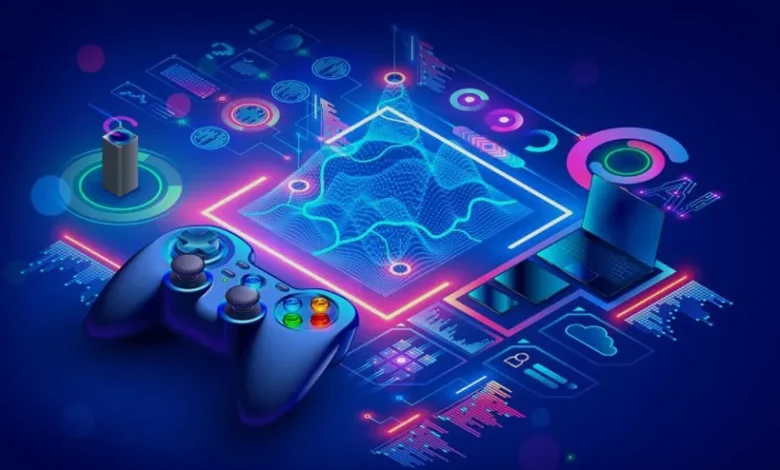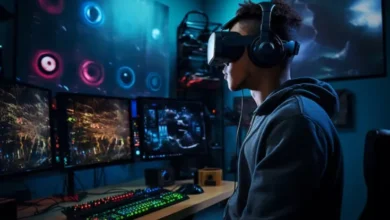The Future Gamer: How AI and Machine Learning are Shaping the Next Generation of Online Play

Contents
- 1 Introduction: A Glimpse into Tomorrow’s Gaming Landscape
- 2 AI in Game Design: Crafting Dynamic Worlds
- 3 Personalized Gameplay: Tailoring Experiences to Individual Players
- 4 Adaptive Difficulty: Challenging Players at Every Level
- 5 AI Opponents: Evolving Competitors in Virtual Arenas
- 6 Procedural Generation: Endless Worlds to Explore
- 7 AI Companions: Virtual Allies in Cooperative Play
- 8 Player Behavior Analysis: Enhancing Social Interactions
- 9 AI Storytelling: Crafting Compelling Narratives
- 10 Virtual Assistants: AI-Powered Guides and Tutors
- 11 AI Content Creation: Empowering Developers
- 12 Predictive Analytics: Anticipating Player Needs
- 13 AI Game Masters: Creating Living Worlds
- 14 Ethical Considerations: Navigating the Future of Gaming
- 15 Conclusion: Embracing the Future of Gaming
Introduction: A Glimpse into Tomorrow’s Gaming Landscape
The future of 188bet is rapidly evolving, driven by advancements in artificial intelligence (AI) and machine learning technologies. In this article, we explore how AI and machine learning are revolutionizing the gaming industry, shaping the experiences of the next generation of gamers.
AI in Game Design: Crafting Dynamic Worlds
AI is transforming the way games are designed and developed, enabling developers to create dynamic, immersive worlds that adapt to player actions and preferences. From procedurally generated environments to AI-driven NPCs (non-player characters), AI technologies are enhancing the depth and complexity of gaming experiences, providing players with endless possibilities for exploration and discovery.
Personalized Gameplay: Tailoring Experiences to Individual Players
Machine learning algorithms analyze player behavior and preferences to personalize gameplay experiences, delivering content and challenges tailored to each player’s unique skill level and play style. This level of customization enhances player engagement and satisfaction, fostering a deeper connection between players and the games they love.
Adaptive Difficulty: Challenging Players at Every Level
AI-powered adaptive difficulty systems dynamically adjust game difficulty based on player performance, ensuring that challenges remain engaging and balanced for players of all skill levels. By continuously adapting to player skill and progress, these systems provide a more rewarding and enjoyable gaming experience, encouraging players to push their limits and improve their skills over time.
AI Opponents: Evolving Competitors in Virtual Arenas
AI opponents powered by machine learning algorithms are becoming increasingly sophisticated, simulating human-like behaviors and strategies to provide a more challenging and realistic gaming experience. From advanced enemy AI in single-player games to intelligent opponents in multiplayer matches, AI-driven adversaries push players to their limits and elevate the level of competition in virtual arenas.
Procedural Generation: Endless Worlds to Explore
Procedural generation algorithms use AI techniques to create vast, procedurally generated worlds filled with diverse landscapes, creatures, and challenges. These dynamically generated environments offer endless opportunities for exploration and adventure, ensuring that no two gaming experiences are ever the same.
AI Companions: Virtual Allies in Cooperative Play
AI-powered companion characters enhance cooperative gameplay experiences by providing support, guidance, and assistance to players during their adventures. Whether serving as teammates in multiplayer matches or companions in single-player campaigns, AI allies contribute to the depth and immersion of gaming experiences, fostering camaraderie and teamwork among players.
Player Behavior Analysis: Enhancing Social Interactions
Machine learning algorithms analyze player behavior and interactions to enhance social features and multiplayer experiences. By identifying patterns, preferences, and social dynamics within gaming communities, these algorithms can recommend friends, matchmake players with compatible teammates, and detect toxic behavior to foster a positive and inclusive gaming environment.
AI Storytelling: Crafting Compelling Narratives
AI-powered storytelling tools enable developers to create dynamic, branching narratives that adapt to player choices and actions. By leveraging machine learning algorithms to generate and evaluate story branches, developers can create immersive and interactive storytelling experiences that respond to player input, leading to deeper emotional engagement and immersion in the game world.
Virtual Assistants: AI-Powered Guides and Tutors
AI-powered virtual assistants provide players with personalized guidance, tips, and tutorials to help them navigate complex game mechanics and challenges. Whether offering strategy advice, answering questions, or providing in-game assistance, these virtual tutors empower players to master new skills and overcome obstacles with confidence.
AI Content Creation: Empowering Developers
AI and machine learning technologies are empowering developers to create content more efficiently and effectively than ever before. From procedurally generated assets and animations to AI-driven level design tools, these technologies streamline the game development process, allowing developers to focus on creativity and innovation while AI handles the heavy lifting.
Predictive Analytics: Anticipating Player Needs
Machine learning algorithms analyze player data to predict future trends, behaviors, and preferences, enabling developers to anticipate player needs and tailor their games accordingly. By leveraging predictive analytics, developers can make informed decisions about game design, content creation, and community management, ensuring that their games remain relevant and engaging in the ever-changing gaming landscape.
AI Game Masters: Creating Living Worlds
AI-powered game masters oversee virtual worlds, dynamically adjusting game events, challenges, and narratives to provide players with a rich and immersive gaming experience. These AI-driven systems monitor player actions and feedback, responding in real-time to create memorable and personalized gaming experiences that keep players coming back for more.
As AI and machine learning technologies continue to shape the future of gaming, it is essential to consider the ethical implications of their use. Developers must prioritize player privacy, fairness, and transparency, ensuring that AI-driven systems enhance the gaming experience without compromising player rights or autonomy.
Conclusion: Embracing the Future of Gaming
The future of gaming is bright with possibilities, as AI and machine learning technologies revolutionize the gaming industry and redefine the way we play. By embracing these innovations, developers can create richer, more immersive gaming experiences that push the boundaries of creativity and imagination, shaping the future of gaming for generations to come.



